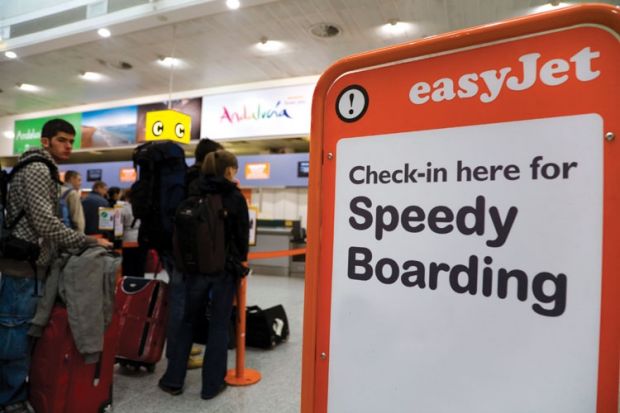Shipping out: from meetings with the students’ union, Dominic Shellard expects huge interest in learning abroad
De Montfort University is planning to send half its students overseas in a multimillion-pound attempt to allay fears that British graduates do not have enough international experience.
The proportion of home students at UK universities who take placements abroad during their degrees is below one in 16, a figure the sector is trying to increase.
The scheme will cost £1.5 million to £2 million a year to run, according to vice-chancellor Dominic Shellard, and is affordable because of the income the university has attracted in recent years from growing numbers of international students.
A six-month pilot will run in the first half of 2014 to “test the appetite” of De Montfort students to go abroad, Professor Shellard explained. From preliminary meetings with the students’ union, he anticipated that there would be “massive interest” and expected the scheme to start properly in 2014-15.
For example, next year a group of students will travel to Brazil to work with the football World Cup organising committee and on the São Paulo stock exchange.
Professor Shellard said the university is “particularly interested” in sending students to South America, but other potential destinations included Western Europe, China, Japan, Vietnam, Cambodia and the US.
Speaking about the 50 per cent target – which will include postgraduates – he said: “We’re pretty confident we can do this. Certainly over a three- to four-year period we think we can reach this target.”
Placements will range from a four-week “immersion” course in a country’s language, history and culture to a year-long work placement, he explained.
Regarding the shorter placements, Professor Shellard said that he wanted to avoid “beers being consumed and nothing else”.
The university will not cover a student’s costs “absolutely fully” while they are away, he said, but no one should be “disadvantaged” because they lack the funds to go.
Given that De Montfort has about 22,000 students, the initiative will require a huge number of flights, creating the potential for a money-saving deal with an airline, Professor Shellard said.
The drive is needed to counter a “misperception” among companies that Britain is “closed for business” in the light of a promised referendum on its membership in the European Union and a tougher visa regime for international students, he said.
It will also enhance individuals’ employment prospects, he claimed, because at present, even if graduates stay in the UK to work, British companies are “worried” that graduates lack “an interest in the outside world”.
UK universities are currently developing a strategy to encourage more British students to go abroad. According to the government’s industrial strategy for education, released in July, just 6 per cent of UK students take placements overseas, compared with an EU target of 20 per cent and a German target of 50 per cent.
david.matthews@tsleducation.com
Not insular: UK graduates need greater understanding of different cultures
One of the most formative experiences of my life was spending the third year of my undergraduate degree in English and modern languages as an “assistant” at a Gesamtschule (comprehensive school) in West Berlin in 1987‑88.
One of my strongest memories is of running back to Checkpoint Charlie – one of the border crossings between East and West Berlin – after a night out, to meet the midnight deadline for re-entry to the West. While it was intensely exciting, I was also conscious of the fact that such division was completely wrong. I have subsequently been aware of the need, whether economically, culturally or socially, for an ever-increasing understanding of different cultures.
Fast-forward to Brazil two weeks ago, where I delivered a lecture to the São Paulo Football Federation. Afterwards, an elderly Brazilian gentleman approached me with a photocopy of a British newspaper article.
“Is it true”, he asked, “that a van is driving around London telling [illegal] immigrants to go home?” You can imagine my embarrassment, awkwardness and even shame.
Luckily, he was gracious enough to spare my blushes; he was actually more interested in asking me how the Brazilian international goalkeeper Júlio César could be the second-choice keeper at Queens Park Rangers, the Championship football club I support!
That was an easier question to answer than why those vans were driving around the capital. But it is something that all of us in higher education must urgently reflect upon.
So as the political football of immigration gets kicked back and forth between government departments, universities need to continue to do what they do best: stimulate intellectual debate to promote greater understanding of different cultures, contribute to the GDP of the UK by recruiting international students and help to give their graduates a global perspective.
But at De Montfort, staff and students want to go even further in their desire to demonstrate to the world that Britain is not an insular country.
Dominic Shellard is vice-chancellor of De Montfort University.
Register to continue
Why register?
- Registration is free and only takes a moment
- Once registered, you can read 3 articles a month
- Sign up for our newsletter
Subscribe
Or subscribe for unlimited access to:
- Unlimited access to news, views, insights & reviews
- Digital editions
- Digital access to THE’s university and college rankings analysis
Already registered or a current subscriber? Login




